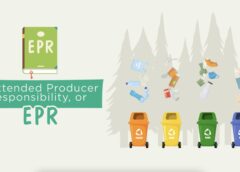Commercial mail producers have another legal development warranting their attention.
What is EPR?
Extended Producer Responsibility (EPR) is a policy approach that has gained traction in the last several years. It aims to shift responsibility for the recycling and related post-use costs of packaging and other recyclable goods onto “producers” – a definition that can reach brand-owner retailers.
As of now, seven states have passed EPR bills: Maine, Oregon, Colorado, California, Washington, New Jersey, and Minnesota. While each of these state laws differs slightly, they generally follow the same structure – requiring producers to pay a certain amount based on the packaging materials they bring into the state, which is then used to fund programs that assist with the end of the packaging material’s life cycle. The goal is to reduce packaging and packaging waste.
What is required?
Though some states allow producers to participate in EPR programs on an individual basis (or as part of an “alternative compliance plan”), most require that the producers form a producer responsibility organization (“PRO”), which then has reporting obligations. Generally speaking, producers will payan annual fee to the PRO; this fee is then passed along to cover the operational costs of the EPR law and recycling costs, and possibly outreach and education efforts.
While each state law has its idiosyncrasies, there are common themes.
For example, the types of producers that these laws apply to are fairly uniform. Someone is a “producer” when they manufacture “covered materials” (more on that later) and own or license the brand/trademark under which the product is sold. If no one meets that definition, the producer is the owner of the brand/trademark under which the product is sold. If no one meets that second definition, the producer is whoever sells the product that uses the covered materials in the state. While there are some variations, this path generally identifies at least one producer in most states.
Further, the types of materials covered by these laws are also similar, including single-use plastic packaging, plastic single-use food service ware, paper products, rigid plastic containers, paper/plastic carryout bags, plastic trash bags, plastic beverage containers, and plastic household cleaning/personal care product containers.
When can enforcement begin?
In some states, program set-up dates have already occurred. As the states begin to ramp up enforcement, however, some relevant dates are approaching: in Colorado, producer responsibility programs must submit a plan proposal to address recycling services for residential covered entities by February 1, 2025 – and updated plans (after 5 years) must include nonresidential covered entities.
While plan submissions were due in Oregon in March 2024, those plans must be implemented by July 1, 2025. Annual registration processes have generally not yet begun.
New Jersey’s statute requires annual registration starting in July 2025, while Maine begins annual reporting requirements in July 2025 and Minnesota does not require annual reporting until April 2029.
Further, some of these states prevent producers from distributing products in their state if they are not in compliance with the EPR requirements. For example, this starts in Colorado on July 1, 2025, while the same applies in Minnesota starting January 1, 2029.
Of course, the key aspect of these laws from a business perspective is the enforcement; how will the state come knocking if these laws are violated? The good news is that none of these statutes creates a private right of action – meaning there is no possibility of a large class-action lawsuit driven by an aggressive plaintiff’s lawyer.
Possible penalties, however, are substantial. Generally, enforcement is by the state Department of Environmental Protection (or similar state agency). Civil penalties can range from $5,000 for the first day of violation and $1,500 per day thereafter in Colorado to $50,000 per day of violation in California.
Conclusions
In sum, EPR laws have already gone into effect in several states, and their obligations are beginning to ramp up. As in the privacy area, it is likely that more states will follow suit and adopt EPR laws of their own – each with its own nuances.
Given the broad scope of the terms “producers” and “covered materials” under many of these laws, you should consider whether your business might be subject to these requirements, opening yourself up to monetary liability and other possible penalties for noncompliance.
We look forward to discussing these issues and answering your questions at our webinar on January 9, 2025.
This article was produced exclusively for Mailers Hub by David Bertoni and Adam Mooney of Brann & Isaacson.
Brann & Isaacson is a boutique law firm that represents large and small online and multichannel companies, printers, commercial mail producers, and IT service providers located across the country. The firm advises companies of all sizes, including many in the Internet Retailer’s Top 500 Guide. The firm is the Mailers Hub recommended legal counsel for mail producers on legal issues, including tax, privacy, consumer protection, intellectual property, vendor contracts, and employment matters.
The points of contact at Brann & Isaacson are: Martin I. Eisenstein, meisenstein@brannlaw.com; David Swetnam-Burland, dsb@brannlaw.com; Stacy O. Stitham, sstitham@brannlaw.com; and Jamie Szal, jszal@brannlaw.com. They can also be reached by phone at (207) 786-3566.


